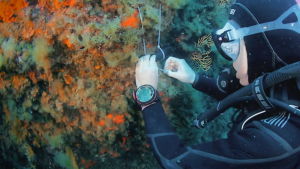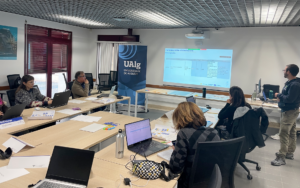How vulnerable is your Marine Protected Area to climate change? Discover a new tool developed by researchers in collaboration with Marine Protected Area managers to assess climate change vulnerability. The results will guide adaptation and help build climate resilience across the Mediterranean basin. The final version will be launched this summer – and it will be free to use!
The Future Oceans Lab – University of Vigo, Spain, in collaboration with Marine Protected Area (MPA) managers, have developed a new climate change Vulnerability Assessment tool. The objective of this tool is to help tracking climate risks, prioritize adaptation actions and integrate social-ecological, economic, and governance perspectives into conservation to cope with climate change scenarios.
A tool created by scientist and managers
The tool was created through a three-step co-development and transfer process. The first step started with MPAEngage project – the predecessor of MPA4Change. For its creation, six Mediterranean MPAs – Calanques National Park, Cap de Creus Nature Park, Tavolara-Punta Coda Cavallo MPA, Portofino MPA, Brijuni National Park and Zakynthos National Marine Park – worked together to fulfil their needs of information towards the climate change adaptation pathway.
MPA managers played an active role in applying the tool, testing its initial version, and providing valuable feedback to improve its functionality and usability.
Testing and fine-tunning process
The second step of the process occurred during the MPA4Change project in which the replicability of the tool was tested under new contexts. The fine-tunned version was applied in two additional MPAs – Cape Greko MPA in the Eastern Mediterranean and the Alentejo and Costa Vicentina MPA in the Southern Portuguese Atlantic – broadening the tool’s applicability beyond the Mediterranean region and demonstrating its potential use in Atlantic MPAs.
After applying this refined version, additional feedback emerged from the new managers involved. These final suggestions were integrated into the tool, helping the Spanish researchers to fine-tune and consolidate the final version and completing the third step of the process.
The co-creation process has been essential, fostering capacity building and learning between MPA managers and researchers. Lessons learned can inform the integration of climate adaptation tools into marine spatial plans and strengthen adaptation efforts in the Mediterranean Sea and beyond.
Hybrid Training on Vulnerability Assessment

Diver installing underwater sensors to track climate change effects at Portofino MPA – Photo by Portofino MPA staff
The outcome of this collaborative process is a complete toolkit, for which training on its operation will be available through the MPA4Change Training programme on climate change adaptation in Marine Protected Areas. Within this training programme, a dedicated Hybrid module on Vulnerability Assessment & Adaptation Plans tailored for MPA managers will be available free of charge in July 2025.
This Module will be released in a Hybrid format, containing an online part with several resources that participants will be able to review through the dedicated training platform, and a face-to-face part aiming to consolidate the knowledge acquired. The in-person practical part will take place in Brijuni National Park (Croatia) in September this year for selected participants.
For more information on this training, please register to MPA4Change mailing list or stay tuned to training updates at this page.



